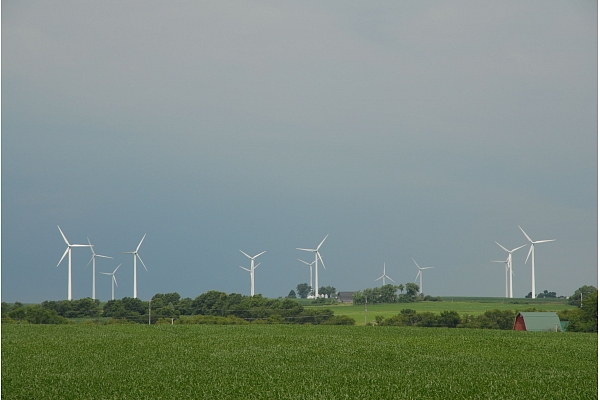Competition gradually beginning to form
Photo: Stock.XCHNG
ENERGY AND UTILITIES SECTOR IN SHORT:
• Electric energy market has been open for open competition since 2007;
• JSC Latvijas Gāze has a monopoly in supply and delivery of natural gas throughout Latvia;
• The state’s renewable energy action plan has defined biomass and biogas as perspective sources of renewable energy.
Electric energy
• Any electric energy consumer in Latvia, including households, has been able to purchase electric energy on the open market since 2007 and choose their own supplier. However, only in 2012, more active steps have been taken towards an open market – as of April this year, there has been an expansion of those who must purchase electricity in the open market, while as of November, households have been able to choose one of the regulated tariffs.
• Starting January 1 this year, Estonia included household consumers in its open electricity market. Latvia was prepared to do so in the autumn of 2013, however, evaluating all the potential risks in a possible increase in electricity rates, this matter has been postponed until progress has been made in reducing the risks of the feed-in tariff system.
• An important step was taken by Latvenergo last year in releasing bonds to attract financing for larger investments. Such an idea was discussed for the past several years.
Natural gas supply
• There is only one player in the supply and delivery of natural has in Latvia – JSC Latvijas Gāze. The company’s shareholders are Germany’s E.ON Ruhrgas (47%), Russia’s Gazprom (34%), and Itera Latvija (16%). Latvijas Gāze and the Latvian government have an agreement on a fixed monopoly until 2014. Gas supply infrastructure in the country is also 100% owned by Latvijas Gāze.
Renewable energy resources
• Renewable energy sources in Latvia have an important place in the country’s total energy resource balance. The main renewable energy resources in Latvia are biomass (wood), as well as hydro-energy resources. Such renewable energy resources as wind-energy, biogas, reeds and other biomasses are used to a lesser extent. In 2011, the proportion of renewable energy was 41,93% of the total energy consumption in the country, according to information from the Central Statistical Bureau.
• Several new biogas cogeneration plants have been opened, while electric energy produced with biogas increased by 88 percent in 2011 when compared to 2010, and reached 107 gigawatt-hours. In 2010, 57 gigawatt-hours was produced.
• The development of green energy is being hindered at the moment by weak legislation environment and the chaotic situation regarding state support for this sector.
Heating and water supply
• 65% of Latvia’s residents receive centralized heating, with a large proportion living in Riga. If heating in rural areas is mainly ensured by firewood, almost all heating in Riga is produced from natural gas.
• Biomass and wood-chip heating plants are also being developed.
• Water supplies are ensured to Latvian residents by local governments and utility companies owned by local governments, which supply water to residents through a centralized water supply system. Centralized water supplies are not available to all residents.
Waste management
• In 2011, one Latvian resident on average produced 350 kilograms of garbage, which was the fourth lowest amount in the EU. Only resident of Slovakia, the Czech Republic and Estonia produce less refuse, according to Eurostat.
• The largest waste collection/management companies in Latvia are Veolia, L&T Hoetika, Eko-Rīga, Eko-Kurzeme.
Future prospects
• On the international level, much attention is currently being paid to the Visaginas Nuclear Power Plant project in Lithuania, which is expected to become one of the main energy sources in the Baltic region. The construction of a regional liquefied natural gas (LNG) terminal is also on the agenda.
• Last year, a consulting firm hired by the European Commission came to the conclusion that the best spot to construct a regional LNG terminal is Estonia. Similar advantages have been noted if the LNG terminal is constructed in Finland. Meanwhile, Latvia has pointed to a number of flaws in the report. This matter is expected to remain on top of the agenda this year as well.
• With the preparations in opening the electricity market for households, one of the most important events expected in 2013 will be the opening of the Nordic electricity bourse Nord Pool Spot (NPS) in Latvia in June, which could influence the price of electricity in the country.
• There is also activity expected in waste recycling this year, as a new recycling plant could be constructed.
• Another issue on the agenda this year will be the liberalization of the gas market in Latvia, which Latvijas Gāze recommended being postponed.
TOP 5 largest companies in energy sector by net turnover 2011
Company
| Specialisation
| Turnover 2011, millions, EUR
| Turnover changes 2011 vs 2010, %
| Profitability, %
| Number of employees
|
JSC Latvenergo
| Electric energy production
| 997,31
| 6,97
| 93,95
| 1 387
|
JSC Latvijas Gāze
| Supply of natural gas
| 502,75
| -0,002
| 7,69
| 1 284
|
JSC Sadales tīkls
| Supply of electric energy
| 308,60
| 10,03
| -6,21
| 2 543
|
Itera Latvija Ltd
| Supply of gas
| 158,83
| 52,18
| 7,36
| 39
|
JSC Augstsprieguma tīkls
| Supply of electric energy
| 87,53
| 6,75
| 2,94
| 165
|
Source: Firmas.lv
Useful links
Economy Ministry
Ministry of Environmental Protection and Regional Development
Latvian Biomass Association
About wind energy
JSC Latvenergo
JSC Latvijas Gāze





